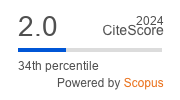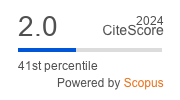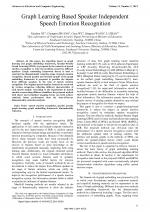| 2/2014 - 3 |
Graph Learning Based Speaker Independent Speech Emotion RecognitionXU, X. |
| Extra paper information in |
| Click to see author's profile in |
| Download PDF |
Author keywords
speech emotion recognition, speaker penalty graph learning, graph embedding framework, dimensionality reduction
References keywords
recognition(12), speech(10), emotion(8), analysis(8), pattern(7), reduction(5), human(5), dimensionality(5), science(4), machine(4)
Blue keywords are present in both the references section and the paper title.
About this article
Date of Publication: 2014-05-31
Volume 14, Issue 2, Year 2014, On page(s): 17 - 22
ISSN: 1582-7445, e-ISSN: 1844-7600
Digital Object Identifier: 10.4316/AECE.2014.02003
Web of Science Accession Number: 000340868100003
SCOPUS ID: 84901856862
Abstract
In this paper, the algorithm based on graph learning and graph embedding framework, Speaker-Penalty Graph Learning (SPGL), is proposed in the research of speech emotion recognition to solve the problems caused by different speakers. Graph embedding framework theory is used to construct the dimensionality reduction stage of speech emotion recognition. Special penalty and intrinsic graphs of the graph embedding framework is proposed to penalize the impacts from different speakers in the task of speech emotion recognition. The original speech emotion features are extracted by various categories, reflecting different characteristics of each speech sample. According to the experiments in speech emotion corpus using different classifiers, the proposed method with linear and kernelized mapping forms can both achieve relatively better performance than the state-of-the-art dimensionality reduction methods. |
| References | | | Cited By |
Web of Science® Times Cited: 6 [View]
View record in Web of Science® [View]
View Related Records® [View]
Updated today
SCOPUS® Times Cited: 13
View record in SCOPUS® [Free preview]
View citations in SCOPUS® [Free preview]
[1] Long-Time Speech Emotion Recognition Using Feature Compensation and Accentuation-Based Fusion, Sun, Jiu, Zhu, Jinxin, Shao, Jun, Circuits, Systems, and Signal Processing, ISSN 0278-081X, Issue 2, Volume 43, 2024.
Digital Object Identifier: 10.1007/s00034-023-02480-6 [CrossRef]
[2] Call Redistribution for a Call Center Based on Speech Emotion Recognition, Bojanić, Milana, Delić, Vlado, Karpov, Alexey, Applied Sciences, ISSN 2076-3417, Issue 13, Volume 10, 2020.
Digital Object Identifier: 10.3390/app10134653 [CrossRef]
[3] Anatomization of the systems of dimension relaxation for facial recognition, Raha, Mayamin Hamid, Deb, Tonmoay, Rahmun, Mahieyin, Chen, Tim, Intelligent Decision Technologies, ISSN 1872-4981, Issue 4, Volume 14, 2021.
Digital Object Identifier: 10.3233/IDT-190120 [CrossRef]
[4] A New Fuzzy Cognitive Map Learning Algorithm for Speech Emotion Recognition, Zhang, Wei, Zhang, Xueying, Sun, Ying, Crippa, Paolo, Mathematical Problems in Engineering, ISSN 1024-123X, Issue 1, Volume 2017, 2017.
Digital Object Identifier: 10.1155/2017/4127401 [CrossRef]
Disclaimer: All information displayed above was retrieved by using remote connections to respective databases. For the best user experience, we update all data by using background processes, and use caches in order to reduce the load on the servers we retrieve the information from. As we have no control on the availability of the database servers and sometimes the Internet connectivity may be affected, we do not guarantee the information is correct or complete. For the most accurate data, please always consult the database sites directly. Some external links require authentication or an institutional subscription.
Web of Science® is a registered trademark of Clarivate Analytics, Scopus® is a registered trademark of Elsevier B.V., other product names, company names, brand names, trademarks and logos are the property of their respective owners.
Faculty of Electrical Engineering and Computer Science
Stefan cel Mare University of Suceava, Romania
All rights reserved: Advances in Electrical and Computer Engineering is a registered trademark of the Stefan cel Mare University of Suceava. No part of this publication may be reproduced, stored in a retrieval system, photocopied, recorded or archived, without the written permission from the Editor. When authors submit their papers for publication, they agree that the copyright for their article be transferred to the Faculty of Electrical Engineering and Computer Science, Stefan cel Mare University of Suceava, Romania, if and only if the articles are accepted for publication. The copyright covers the exclusive rights to reproduce and distribute the article, including reprints and translations.
Permission for other use: The copyright owner's consent does not extend to copying for general distribution, for promotion, for creating new works, or for resale. Specific written permission must be obtained from the Editor for such copying. Direct linking to files hosted on this website is strictly prohibited.
Disclaimer: Whilst every effort is made by the publishers and editorial board to see that no inaccurate or misleading data, opinions or statements appear in this journal, they wish to make it clear that all information and opinions formulated in the articles, as well as linguistic accuracy, are the sole responsibility of the author.



